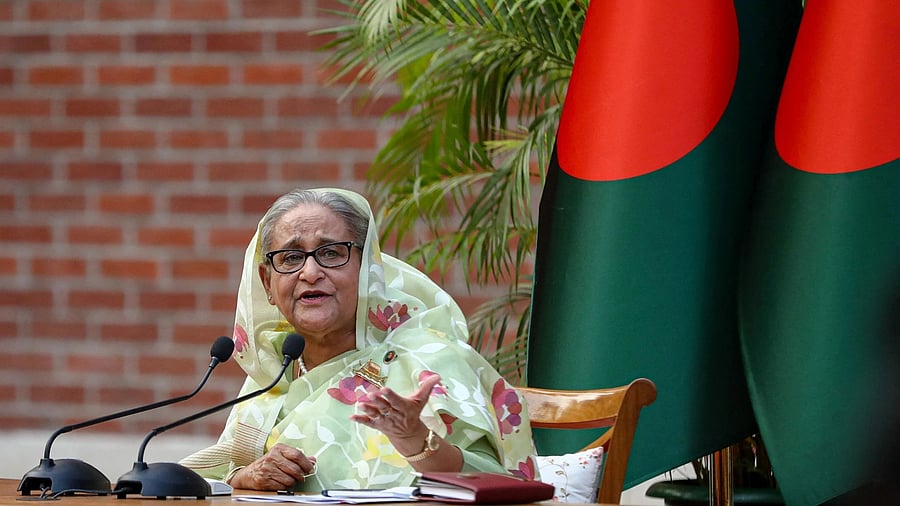
Sheikh Hasina.
Credit: Reuters Photo
Dhaka: Bangladesh’s International Crimes Tribunal (ICT-BD) on Thursday announced it would deliver the verdict against deposed prime minister Sheikh Hasina on November 17 after her trial in absentia on charges of crimes against humanity.
“The three-judge tribunal set November 17 for delivering the verdict,” a journalist attending the tightly secured special court in the capital told PTI.
Hasina, her home minister in the ousted Awami League government, Asaduzzaman Khan Kamal and then inspector general of police (IGP) or police chief Chowdhury Abdullah Al-Mamun were tried in the tribunal. The ex-premier and Kamal were tried in absentia, with the court declaring them fugitives.
ICT-BD Chief Prosecutor Mohammad Tajul Islam earlier demanded the death penalty for the accused.
Mamun faced the trial in person but emerged as an approver or state witness.
The former police chief appeared on the dock as the ICT-BD chair Justice Mohammad Golam Mortuza Majumder fixed the date.
The tribunal on October 23 concluded the hearing on the case after over 28 working days, when 54 witnesses testified before the court describing how efforts were made to tame last year’s student-led movement called July Uprising that toppled Hasina’s now disbanded Awami League government on August 5, 2024.
The Bangladesh capital on Thursday woke up to a heightened security vigil over the “Dhaka lockdown” call by the Awami League, coinciding with a tribunal’s announcement of the verdict date.
Authorities called up army troops, paramilitary Border Guard Bangladesh (BGB) and police in riot gear to spread a security blanket in and around the International Crimes Tribunal (ICT-BD) complex at central Dhaka.
The security vigil amid the Awami League called “lockdown” prompted thousands to stay indoors.
Witnesses and reports said Dhaka streets looked unusually empty, though many commuters stepped out of their homes and cautiously headed for workplaces and schools.
However, many private institutions, including private universities, preferred to operate online, fearing the outbreak of violence.
Transport operators said passenger numbers on long-haul buses leaving Dhaka dropped sharply, while the capital’s major Gabtoli bus terminal remained largely empty with fewer trips and delayed departures.
Hasina and the two others were accused of committing crimes under five counts, with the first one alleging the defendants of murder, attempted murder, torture, and other inhumane acts.
The second count accused Hasina of ordering the “extermination” of protesters. Under the third count, she was accused of making inflammatory remarks and ordering the use of deadly weapons against protesting students.
Under the rest of the counts, the defendants were charged with the shooting and murder of six unarmed protesters, including students in Dhaka and its suburbs.
In several recent interviews with major international news outlets and the Indian media, Hasina called the ICT-BD a “kangaroo court” run entirely by men linked to her political opponents.
In an emailed interview to PTI published on Wednesday, Hasina said she was prepared to stand trial under international supervision “even at the International Criminal Court” in The Hague, but alleged that Yunus has avoided such a process because an impartial tribunal would acquit her.
“I have repeatedly challenged Yunus’ government to prosecute me in the International Criminal Court, if it is so confident of its case. Yunus continues to duck this challenge because he knows that the ICC, a genuinely impartial tribunal, would certainly acquit me,” she said. UK-based leading law firm Doughty House Chambers earlier this week submitted an “urgent appeal” to the United Nations, saying Hasina was being tried in “an environment charged with political vengeance, under an unelected interim government with no democratic mandate”.
Last month, Awami League filed an application with the Hague-based ICC, accusing the Yunus-led interim administration of crimes against humanity, including killings and arbitrary arrests of its members.
Former foreign minister in Hasina’s cabinet, AK Abdul Momen, who previously served as Bangladesh’s permanent representative to the United Nations, last month sent a letter to the UN Human Rights Council, detailing allegations of “political suppression, enforced disappearances, cases against military officers, impunity for criminals, and attacks on journalists”.